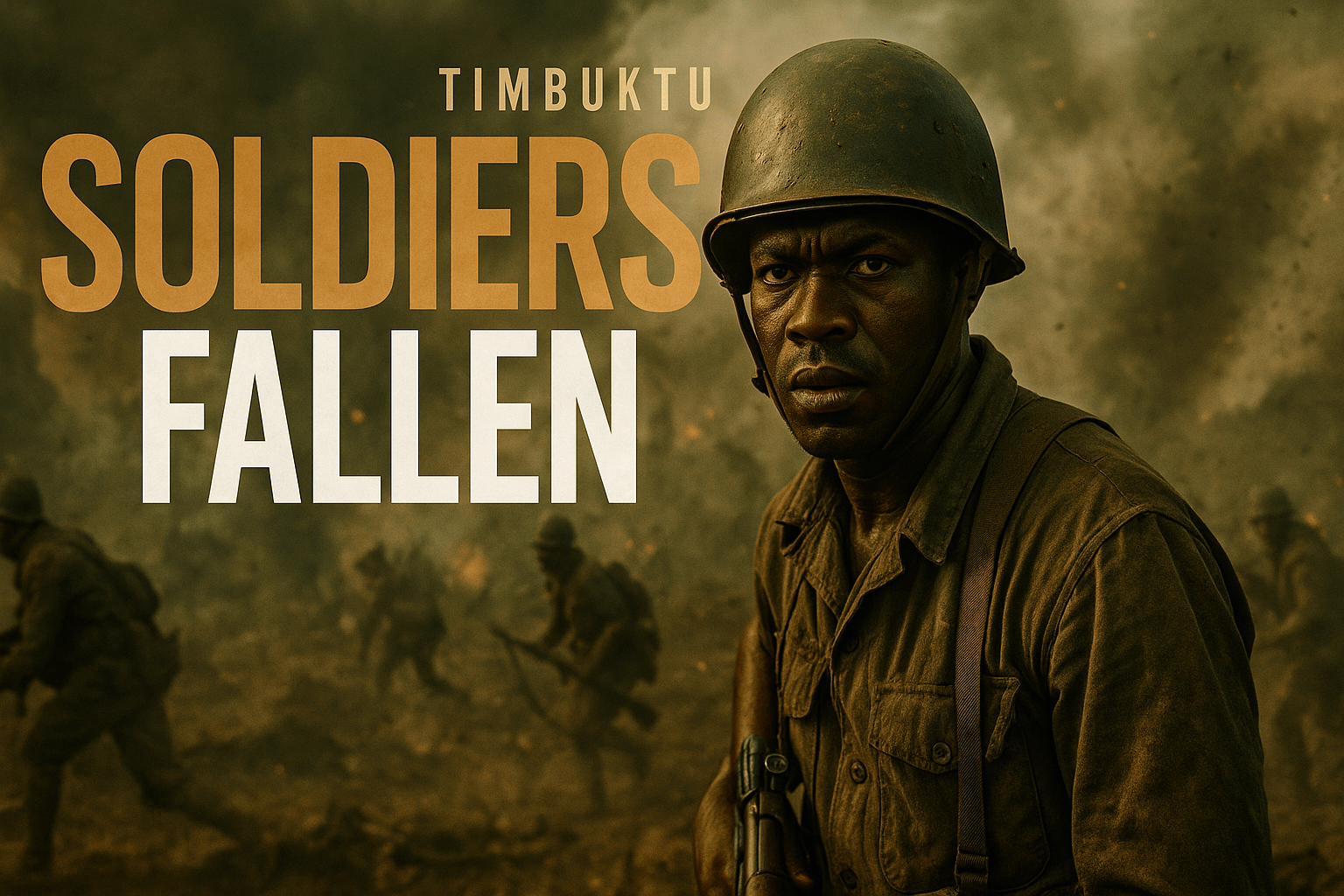
Listen & Share
Mali’s Twin Attacks: Examining Sahel’s Conflict
By Darius Spearman (africanelements)
Support African Elements at patreon.com/africanelements and hear recent news in a single playlist. Additionally, you can gain early access to ad-free video content.
Sahel Unrest
The Sahel region of West Africa continues to grapple with intense security challenges, a situation that often flies under the radar in mainstream media but deeply impacts Black communities globally. Recently, Mali experienced coordinated assaults that highlight the ongoing struggle against extremist groups in the area. These were twin attacks, targeting military bases in two critical locations: the historic city of Timbuktu and the central Malian town of Boulkessi. These incidents resulted in significant casualties and reveal the persistent, evolving nature of conflict in an important region for the African Diaspora.
In addition to the immediate devastation, these attacks underscore the broader instability that extremist groups sow across the Sahel. For African Americans and those in the diaspora, understanding these events is crucial. It connects us to ongoing struggles for self-determination and stability on the continent. The violence impacts human lives, displaces communities, and threatens the cultural heritage of places like Timbuktu, a city with deep historical ties to African scholarship and trade, which should resonate with anyone invested in Black excellence and history.
Understanding the Threat: GSIM and Jihadism
A major player in these conflicts is GSIM, which stands for Group for Support of Islam and Muslims. GSIM is also known by its Arabic name, Jama’at Nusrat al-Islam wa al-Muslimeen, or JNIM. This powerful coalition aligns with al-Qaeda and operates primarily across the Sahel, with a major footprint in Mali and its neighboring countries. Its formation in March 2017 brought together several al-Qaeda-aligned groups, including Ansar al-Din, al-Qaeda in the Islamic Maghreb, al-Mourabitoun, and Katibat Macina (ECFR).
GSIM’s primary objective is to establish a Salafi-Islamist state throughout West Africa, an ambition they aggressively pursue through attacks on military forces. They have been active in Mali, Burkina Faso, and Niger, employing various tactics including sophisticated improvised explosive device attacks (Institute for the Study of War). The group maintains loyalty to al-Qaeda while aiming to drive foreign forces out of the region and impose their specific version of Islamic law (ECFR). This ideology fuels the ongoing violence and complicates efforts to bring lasting peace to the region.
Key Attack Locations and Details
Timbuktu Army Base
Target: Military camp and airport
Involvement: Terrorist fighters attempted infiltration, leading to heavy gunfire and shelling.
Malian Response: Army foiled the attack, neutralizing 13-14 terrorists and capturing 31 suspects.
Boulkessi Army Base
Location: Central Mali, near the Burkina Faso border.
Casualties: At least 30 soldiers killed.
Involvement: Part of the twin attacks, signifying coordinated efforts by extremist groups.
Casualties and Accountability
The recent assaults led to significant loss of life on both sides. In the Boulkessi attack, near the Burkina Faso border, at least 30 Malian soldiers were killed (Lemonde.fr). Meanwhile, GSIM proudly claimed they had killed and wounded “dozens” of soldiers during the attacks (MEMRI). Such conflicting claims are common in these conflicts, highlighting the propaganda aspect of warfare as groups seek to bolster their image.
The Malian army, conversely, reported that they neutralized 14 attackers in Timbuktu according to their general staff, with another report citing 13 (Lemonde.fr, Anadolu Agency). The term “neutralized” in military reporting generally means rendering an enemy incapable of further action, which can include killing, wounding, or capturing. While it does not always specify an outcome, in these contexts, it implies the removal of a threat. The Malian military further announced the capture of 31 suspected terrorists in Timbuktu (Lemonde.fr). This brings up important questions about accountability for the perpetrators and how justice is pursued in a region frequently destabilized by violence.
Casualties and Suspects from Recent Mali Attacks
Timbuktu’s Enduring Struggle
Timbuktu, a city renowned for its historical significance as a major center of Islamic learning and trade, has become a repeated target in the ongoing Sahel conflict. Its cultural value and strategic location make it a flashpoint for extremist groups seeking control and influence. The recent attempt by terrorist fighters to infiltrate the military camp and target the airport with heavy gunfire and shelling demonstrates the audacity of these groups (Lemonde.fr). The Malian army’s successful repulsion of the attack shows their resilience and commitment to defending the base. Local residents and officials confirmed that the military camp’s defense was effective (Arab News).
The conflict in Mali is complex, involving not only the Malian forces but also various jihadist groups and the broader regional instability that allows them to thrive. The attacks near the Burkina Faso border, for example, underscore the interconnectedness of security challenges across West Africa. The porous borders in the Sahel facilitate movement and coordination among extremist elements, making regional security efforts vitally important (Institute for the Study of War). Without strong regional cooperation, these groups continue to exploit vulnerabilities, impacting the lives of ordinary citizens and perpetuating cycles of violence.
The Wider Picture: International Involvement and Civilian Impact
The situation in Mali and the wider Sahel is not solely an internal matter; it has drawn significant international attention and involvement. Countries like France have had military forces actively engaged in counter-terrorism efforts, alongside the United Nations peacekeeping presence, MINUSMA (ECFR). These international interventions aim to stabilize the region and combat the spread of extremism. However, their presence often comes with complexities, sometimes leading to debates about sovereignty and effectiveness in the long term.
The human cost of this prolonged conflict is immense, particularly for civilians. The attacks frequently lead to displacement, loss of livelihoods, and profound psychological trauma. While specific data on civilian casualties directly from these twin attacks is limited in the provided reports, the general trend in the Sahel indicates a devastating impact on communities. This includes heightened food insecurity, disruptions to education, and humanitarian crises. For the African Diaspora, engaging with such narratives means recognizing the challenges faced by our kin on the continent and advocating for solutions that prioritize human rights, sustainable development, and genuine African agency in resolving these conflicts.
GSIM’s Core Motives and Objectives
Ideological Zeal
GSIM aims to establish a strict Salafi-Islamist state throughout West Africa, imposing its interpretation of Islamic law.
Expelling Foreign Powers
A key objective is to drive out all foreign military forces and influences from the Sahel region.
Regional Expansion
The group seeks to spread its influence, exploiting existing instabilities and expanding operations across Mali, Burkina Faso, and Niger.
Disrupting Stability
Through attacks on military bases and strategic locations, GSIM aims to destabilize governments and undermine security efforts.
The Road Ahead for Mali
The recent twin attacks in Mali serve as a stark reminder of the persistent and evolving security challenges facing the nation. The Malian military has demonstrated its capacity to respond effectively, repelling sophisticated infiltration attempts and capturing numerous suspects. However, the shadow of groups like GSIM, with their expansionist and ideological goals, continues to loom large over the Sahel. Their ability to conduct coordinated attacks across vast distances, including near the critical Burkina Faso border, highlights the need for robust and sustained security efforts.
For the African American community and the diaspora, understanding these dynamics means more than just acknowledging the news; it is about recognizing interconnected histories, advocating for peace, and supporting African nations in their pursuit of self-determination. The conflict has tangible impacts on African lives, culture, and progress that require sustained attention beyond the headlines. As Mali navigates this complex landscape, the support and solidarity from the global African community remain essential in fostering long-term stability and resilience.
ABOUT THE AUTHOR
Darius Spearman has been a professor of Black Studies at San Diego City College since 2007. He is the author of several books, including Between The Color Lines: A History of African Americans on the California Frontier Through 1890. You can visit Darius online at africanelements.org.

